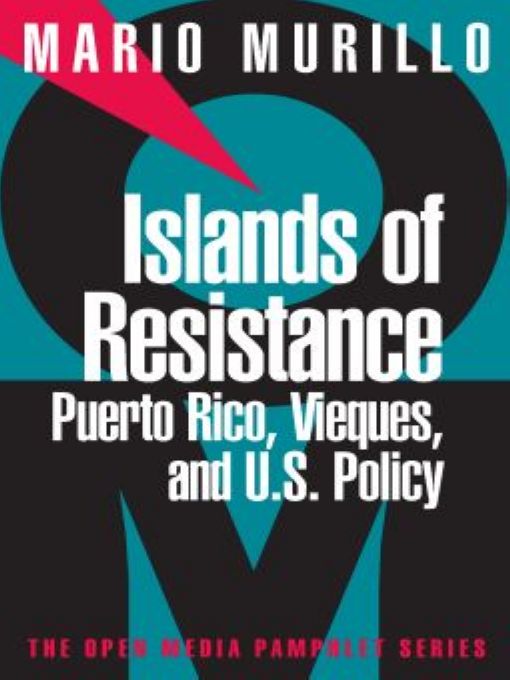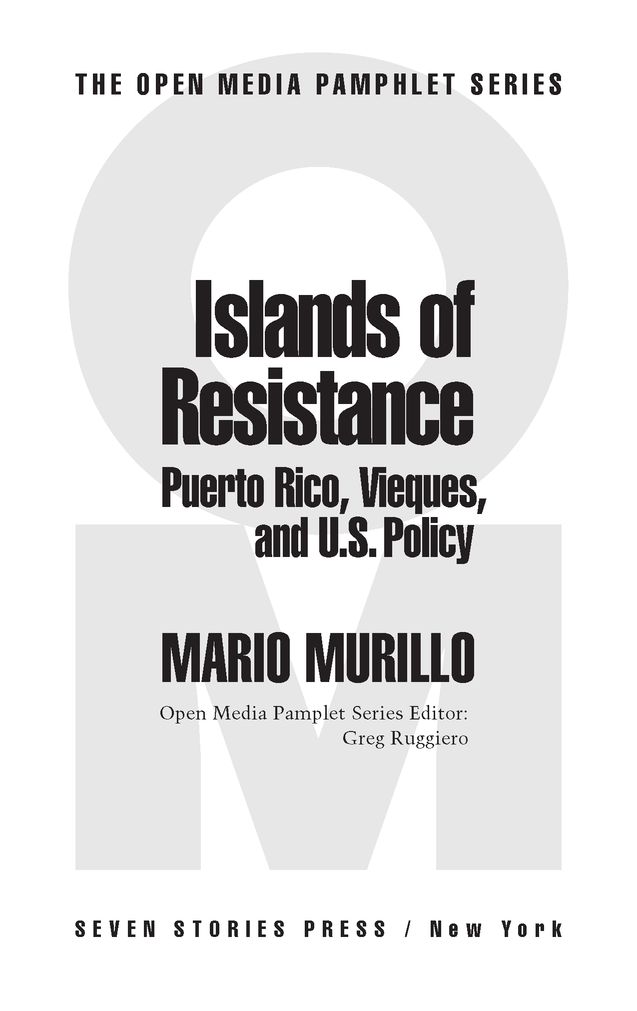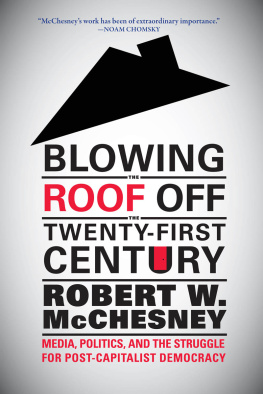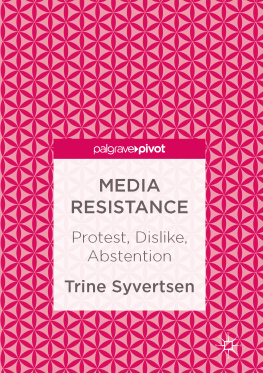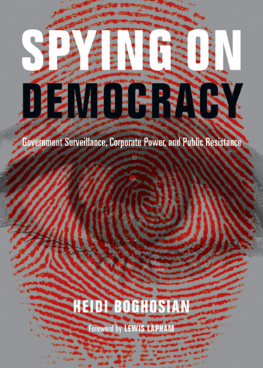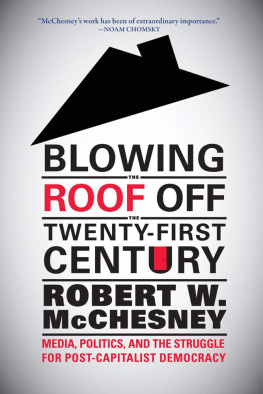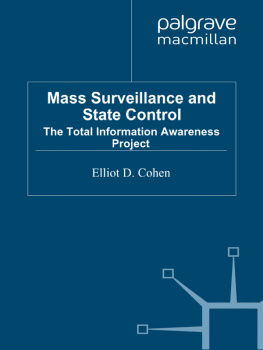Table of Contents
THE OPEN MEDIA PAMPHLET SERIES
SPECIAL THANKS TO: Megan Costello, who researched and helped write the section on media coverage; Robert Rabin of the Committee for the Rescue and Development of Vieques, for providing me and many others with key information about the struggle against the navy; John Lindsay Poland of the Fellowship of Reconciliation Task Force on Latin America and the Caribbean; Ben the Pen Ramos; Esperanza Martell of Pro Libertad, for her tireless work for the community; Dr. Emilio Pantojas and Dr. Jorge Rodriguez Beruf of the University of Puerto Rico, Rio Piedras; and Maria Victoria Maldonado for her opinions and extraordinary patience.
We have not come to make war upon the people of a country that for centuries has been oppressed, but on the contrary, to bring you protection to promote your prosperity, and to bestow upon you the immunities and blessings of the liberal institutions of our government.
General Nelson Miles
July 25, 1898
Gunica, Puerto Rico
Under the Constitution of the United States, no power is given to the federal government to acquire territory to be governed permanently as colonies.
From the Congressional Record 55th Congress, first session, February 6, 1899
INTRODUCTION
In the early 1990s, Puerto Rican activists representing the islands three main political currents kept pointing to 1998 as a milestone year that was going to put Puerto Rico back on the map of U.S. political consciousness. Much as 1992 had been a rallying cry for the indigenous rights movement across the Americas, when five hundred years of resistance was to be celebrated against the backdrop of the countless official commemorations of the European encroachment on the Western Hemisphere, 1998 was being anticipated as a pivotal moment for the Puerto Rican movement toward self-determination, to rekindle the spark that had dwindled in the infant days of the post-Cold War era.
From the many organizations doing tireless work to free the jailed Puerto Rican nationalists, to the many pro-independence and pro-statehood groups that had been mobilizing around the status issue for years, to the many U.S.-based activists who emerged from the radical movements of the 1960s and 70s, Puerto Ricans on the island and in the United States were looking forward to 1998 as a watershed opportunity in their struggle to alter the colonial relationship with the United States that the island has endured for the entire 20th century.
The reasons for this universal enthusiasm were simple, if not obvious. Centennial moments dont come around too often, and 1998 marked the 100th anniversary of the U.S. invasion of Puerto Rico in the final stages of the Spanish-American War. It was on July 25, 1898, that the U.S. Marines landed in the southern coastal town of Gunica at the end of the Spanish-American War, an event that would forever alter the history of Puerto Rico. Depending on ones political perspective, this date marks either the beginning of a century of U.S. colonial domination of Puerto Rican society or the beginning of a unique relationship that has reaped tremendous benefits for the Caribbean island of 4 million people. The thinking of Puerto Ricans was that this centennial commemoration, however artificial, would provide an opportunity to either denounce the colonialist policies of the United States regarding Puerto Rico or embrace the close relationship that has existed between the two nations since they were unceremoniously joined by U.S. military intervention at the turn of the nineteenth century.
For the pro-statehood movement, the centennial was a time to celebrate the rewards of a 100-year connection to the United States that has made Puerto Rico the shining star in the Caribbean. At the same time, according to the annexationist pro-statehooders, this connection was still incomplete, and indeed remained a colonial one that needed to be solidified permanently by an act of Congress that would make Puerto Rico the 51st state of the United States. The year 1998 symbolized the celebration of our people of one hundred years of union with the United States, a date that one hundred years ago brought the stars and stripes into Puerto Rico with an accompanying promise of democracy and equal rights for our people, said pro-statehood Governor Pedro Rosell on the eve of the commemoration.
For the proponents of the Free Associated State, or the so-called commonwealth status, led by the Popular Democratic Party (PPD), 1998 was seen as a time to celebrate the virtues of a U.S.-imposed citizenship that had reaped countless benefits for a people that still took pride in its Latino-Caribbean roots and culture. To describe the relationship between the United States and Puerto Rico as colonial, the populares argue, is to ignore the autonomy that island residents and their government enjoy, while rejecting the freedom islanders maintain as U.S. citizens. In other words, for the defenders of the status quo, 1998 was a time to once again embrace the best of both worlds, which for years had been in their eyes unjustifiably characterized as a colonial limbo.
For the many different sectors of Puerto Ricos independence movement, 1998 was a time to reflect on the U.S. invasion of one hundred years earlier, while at the same time celebrating a tradition of resistance that has made heroes of the likes of Don Pedro Albizu Campos, Eugenio Maria de Hostos, and Ramn Emeterio Betances, to name a few. The independentistas, forever ostracized and persecuted for their firm belief that Puerto Rico is a nation in and of itself and that the United States has no right or jurisdiction over the island, thought that 1998 would force the powers in Washington to seriously address the islands status question, and that once all options were deemed unattainable, independence would be the inevitable outcome. When one hundred years passes by and the United States realizes the fact that it is the last colonial power in the world, a number of people will be asking what should happen to Puerto Rico, said Puerto Rican senator Rubn Berros Martinez of the Puerto Rican Independence Party (PIP).
As it turned out, despite the hype and anticipation, 1998 came and went, and very little, if anything, changed. When the year so much attention was going to be directed toward Puerto Rico had passed, the islands status had not come any closer to being resolved, the internal divisions in Puerto Rico remained, and the U.S. political establishment continued its unwillingness to resolve the colonial situation of Puerto Rico. In fact, with the exception of a brief congressional debate over a piece of legislation aimed at addressing the status question, very few people asked the question, What should be done with Puerto Rico? Once again, the Puerto Rico question fell into the medias silent abyss and was received with the collective indifference that has characterized North American attitudes towards Puerto Rico and its people for generations.
In 1998 I made several visits down to the island, having made a commitment a few years earlier to do something special for Puerto Rico on its momentous anniversary. I wanted to mark the moment with a personal reflection about what Puerto Rico meant to me, both as a U.S.-born Puerto Rican who had always felt a close connection to the peoples struggle for self-determination and as an independent radio journalist who for years had covered the many social, economic, and political developments of the entire Latin American and Caribbean region. My reports and radio documentaries looked closely at the imperial enterprise of the United States in Latin America and the Caribbean, almost always with a particular focus on how the United States utilized its immense war machine throughout the Western Hemisphere to protect its own economic and strategic interests. Puerto Rico was perhaps the best example of this enterprise.

